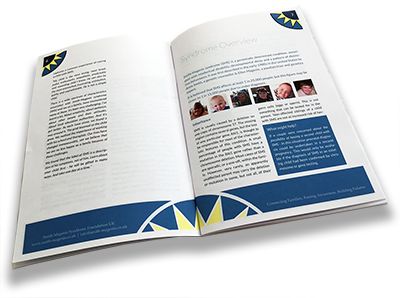Newlife’s Emergency Equipment Loan Service
Emergency hospital documents for download
Other Support Organisations
Information Booklet
Smith-Magenis Syndrome is a complex disability. Each individual will exhibit different aspects of the characteristics and so each family with develop their own ‘coping’ strategies. It is important to get professionals involved early on to provide the family with the support needed. Input from Paediatricians, Speech and Language therapists, Physiotherapists, Educational Professionals, Portage, Social Services, Child and Adult Mental Health Services etc are all very important and a multi-agency approach is vital!
SMS: Guidelines for Parents and Teachers

Our booklet provides a lot of practical helpful advice about coping with all aspects of SMS. It covers sleep, social relationships, behaviours, feeding difficulties, toilet training, dressing, school concerns, behaviour in adulthood, siblings and sources of further help.
You can download a copy (pdf) or purchase a Kindle version at £1.49 through Amazon.
Translations
This booklet has now also been translated into German, Portuguese, and Italian and can be downloaded using the links below. Many thanks to Dr. Alexander Ströher (German), Fernanda Perla (Portuguese), and Xheni Prebibaj (Italian) for the booklet translations.
Here are a few of the idea’s offered in the booklet
Sleep
As children with SMS grow older many develop severe sleeping problems, this includes frequent waking and early rising. During the waking periods ( which can be quite lengthy) it is quite common for challenging behaviours to be exhibited. As a result of this it is important to try to minimise the impact of these periods of other family members. Many families have discussed sleep medication with their paediatrician or consultant – medication such as melatonin is widely used with varying effect. Some parents have stated the slow release melatonin is most effective.
Many families have also found the following to minimise the impact;
- Create a room where the child/adult cannot cause harm to themselves
- Have safe activities in the room to keep the child engaged during their waking time
- Safety gates or secure room systems e.g ‘safe spaces’ to prevent a child/adult injuring themselves from injury if they wander throughout the house. Or some find locking other doors within the house more effective
- Some parents set ‘alarm systems’ to inform them if their child leaves their bedroom
- The use of black out blinds, to create total darkness.
As with all children, it is important that clear routines and firm boundaries are put into place early on.
Behaviour
Individuals with SMS can display very complex behaviours, they can display anxiety, agitated outbursts, aggression, self harming, obsessive behaviours. Support from professionals with delaing with these behaviours is very important and some families opt for behaviour medication ( again consultation with professionals is required).
However quite often families have found the following to be useful:
- Keep schedules as predictable as possible- This does not mean keep everything the same all the time, but it has been found to be very beneficial to provide as much notice as possible of any changes.
Social stories – Help to explain situations or changes that may occur and the feelings involved - The use of visual cues – e.g. pictures or objects can help to show what is happening next, or what may be needed. This is particularly helpful when being asked repetitive questions such as “Where are we going?” or “What are we doing” or “ Where is …” etc
- Trying to maintain an emotional neutral environment – whilst this can be difficult in day to day life, as individuals with SMS can be very sensitive and anxious of others feelings, they can impacted by emotions of those around them
- Consequences and rewards for behaviours need to be immediate and consistent- Whatever methods of consequence or rewards are used the approach must always be consistent, followed up and used. Immediate praise, sticker, offer to help etc
- Praise of positive behaviour and as little notice as possible of difficult behaviour – whilst it is difficult to ignore unwanted behaviours, individuals with SMS thrive on adult attention, by receiving it when they are displaying difficult behaviours, but receiving a lot when displaying positive behaviours will hopefully become a useful behaviour management technique.
Sometimes you will just need to leave your child to work though the outburst – ensure they are safe, if possible turn away so they understand that the behaviour is not acceptable. Remain calm and only intervene if necessary.
Please refer to the booklet for further information.
